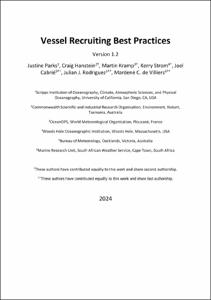Notice
This is not the latest version of this item. The latest version can be found at: https://repository.oceanbestpractices.org/handle/11329/2583.2
Vessel Recruiting Best Practices. Version 1.2.
| dc.contributor.author | Parks, Justine | |
| dc.contributor.author | Hanstein, Craig | |
| dc.contributor.author | Kramp, Martin | |
| dc.contributor.author | Strom, Kerry | |
| dc.contributor.author | Cabrié, Joel | |
| dc.contributor.author | Rodriguez, Julian J. | |
| dc.contributor.author | de Villiers, Mardené C. | |
| dc.date.accessioned | 2024-10-03T12:57:24Z | |
| dc.date.available | 2024-10-03T12:57:24Z | |
| dc.date.issued | 2024 | |
| dc.identifier.citation | Parks, Justine, Hanstein, Craig, Kramp, Martin, Strom, Kerry, Cabrié, Joel, Rodriguez, Julian J. and de Villiers, Mardené C. (2024) Vessel Recruiting Best Practices. Version 1.2. La Jolla, CA, Scripps Institution of Oceanography, 14pp. DOI: https://doi.org/10.25607/OBP-2029 | en_US |
| dc.identifier.uri | https://repository.oceanbestpractices.org/handle/11329/2583 | |
| dc.identifier.uri | https://doi.org/10.25607/OBP-2029 | |
| dc.description.abstract | Ships of opportunity, such as commercial transport, fishing, recreational, and research vessels, are excellent resources to reduce the costs of sea-going data collection. Because they are already operating in a given ocean region, they can provide a research equipment platform without the primary expense of chartering. While many vessel operators are eager to assist researchers for the good of society, if the operation is non-essential to their enterprise, the partnerships are susceptible to termination due to the slightest conflict. One bad incident can cause a company or an entire industry segment to enact policies against non-essential personnel, therefore, it is critical for users of ships of opportunity to carefully follow protocols designed to create a safe and positive experience for both parties. These best practices for successfully partnering with ships of opportunity to engage in meteorological and ocean observing activities emphasize the recruitment of commercial vessels including communication, etiquette, safety, installation, and logistics. The goal of promoting these techniques is to help assure a successful research endeavour and to foster greater participation from commercial industries. The suggested methods were developed from the experiences of the Volunteer Observing Ship (VOS) Scheme and the Ship of Opportunity Program (SOOP) under the Ship Observations Team (SOT), a network of the Global Ocean Observing System, Observations Coordination Group (GOOS, OCG) and Science Research on Commercial Ships (Science RoCS). | en_US |
| dc.language.iso | en | en_US |
| dc.publisher | Scripps Institution of Oceanography | en_US |
| dc.subject.other | Ships of Opportunity | en_US |
| dc.subject.other | Ship of Opportunity Program | en_US |
| dc.subject.other | SOOP | en_US |
| dc.subject.other | Voluntary Observing Ships (VOS) | en_US |
| dc.subject.other | Ship Observations Team | en_US |
| dc.subject.other | Data Collection | en_US |
| dc.subject.other | WMO-IOC-Ship Observations Team | |
| dc.title | Vessel Recruiting Best Practices. Version 1.2. | en_US |
| dc.type | Report | en_US |
| dc.description.status | Published | en_US |
| dc.format.pages | 14pp. | en_US |
| dc.description.refereed | Refereed | en_US |
| dc.publisher.place | La Jolla, CA | en_US |
| dc.subject.parameterDiscipline | Physical oceanography | en_US |
| dc.subject.parameterDiscipline | Meteorology | en_US |
| dc.subject.dmProcesses | Data acquisition | en_US |
| dc.description.currentstatus | Current | en_US |
| dc.description.sdg | 14.a | en_US |
| dc.description.maturitylevel | Mature | en_US |
| dc.description.adoption | Validated (tested by third parties) | en_US |
| dc.description.adoption | Multi-organisational | en_US |
| dc.description.adoption | International | en_US |
| dc.description.methodologyType | Method | en_US |
| dc.description.methodologyType | Specification of criteria | en_US |
| obps.contact.contactname | Justine Parks | |
| obps.contact.contactemail | jdparks@ucsd.edu |
Files in this item
This item appears in the following Collection(s)
-
JCB_JCOMM Commmunity Practices Collection [14]
A selection of documents describing community and best practices
 Repository of community practices in Ocean Research, Applications and Data/Information Management
Repository of community practices in Ocean Research, Applications and Data/Information Management
